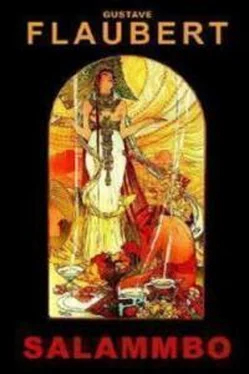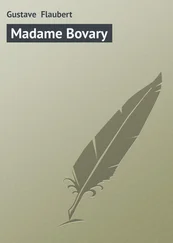Salammbo
Gustave Flaubert
It was at Megara, a suburb of Carthage, in the gardens of Hamilcar. The soldiers whom he had commanded in Sicily were having a great feast to celebrate the anniversary of the battle of Eryx, and as the master was away, and they were numerous, they ate and drank with perfect freedom.
The captains, who wore bronze cothurni, had placed themselves in the central path, beneath a gold–fringed purple awning, which reached from the wall of the stables to the first terrace of the palace; the common soldiers were scattered beneath the trees, where numerous flat–roofed buildings might be seen, wine–presses, cellars, storehouses, bakeries, and arsenals, with a court for elephants, dens for wild beasts, and a prison for slaves.
Fig–trees surrounded the kitchens; a wood of sycamores stretched away to meet masses of verdure, where the pomegranate shone amid the white tufts of the cotton–plant; vines, grape–laden, grew up into the branches of the pines; a field of roses bloomed beneath the plane–trees; here and there lilies rocked upon the turf; the paths were strewn with black sand mingled with powdered coral, and in the centre the avenue of cypress formed, as it were, a double colonnade of green obelisks from one extremity to the other.
Far in the background stood the palace, built of yellow mottled Numidian marble, broad courses supporting its four terraced stories. With its large, straight, ebony staircase, bearing the prow of a vanquished galley at the corners of every step, its red doors quartered with black crosses, its brass gratings protecting it from scorpions below, and its trellises of gilded rods closing the apertures above, it seemed to the soldiers in its haughty opulence as solemn and impenetrable as the face of Hamilcar.
The Council had appointed his house for the holding of this feast; the convalescents lying in the temple of Eschmoun had set out at daybreak and dragged themselves thither on their crutches. Every minute others were arriving. They poured in ceaselessly by every path like torrents rushing into a lake; through the trees the slaves of the kitchens might be seen running scared and half–naked; the gazelles fled bleating on the lawns; the sun was setting, and the perfume of citron trees rendered the exhalation from the perspiring crowd heavier still.
Men of all nations were there, Ligurians, Lusitanians, Balearians, Negroes, and fugitives from Rome. Beside the heavy Dorian dialect were audible the resonant Celtic syllables rattling like chariots of war, while Ionian terminations conflicted with consonants of the desert as harsh as the jackal's cry. The Greek might be recognised by his slender figure, the Egyptian by his elevated shoulders, the Cantabrian by his broad calves. There were Carians proudly nodding their helmet plumes, Cappadocian archers displaying large flowers painted on their bodies with the juice of herbs, and a few Lydians in women's robes, dining in slippers and earrings. Others were ostentatiously daubed with vermilion, and resembled coral statues.
They stretched themselves on the cushions, they ate squatting round large trays, or lying face downwards they drew out the pieces of meat and sated themselves, leaning on their elbows in the peaceful posture of lions tearing their prey. The last comers stood leaning against the trees watching the low tables half hidden beneath the scarlet coverings, and awaiting their turn.
Hamilcar's kitchens being insufficient, the Council had sent them slaves, ware, and beds, and in the middle of the garden, as on a battle–field when they burn the dead, large bright fires might be seen, at which oxen were roasting. Anise–sprinkled loaves alternated with great cheeses heavier than discuses, crateras filled with wine, and cantharuses filled with water, together with baskets of gold filigree–work containing flowers. Every eye was dilated with the joy of being able at last to gorge at pleasure, and songs were beginning here and there.
First they were served with birds and green sauce in plates of red clay relieved by drawings in black, then with every kind of shell–fish that is gathered on the Punic coasts, wheaten porridge, beans and barley, and snails dressed with cumin on dishes of yellow amber.
Afterwards the tables were covered with meats, antelopes with their horns, peacocks with their feathers, whole sheep cooked in sweet wine, haunches of she–camels and buffaloes, hedgehogs with garum, fried grasshoppers, and preserved dormice. Large pieces of fat floated in the midst of saffron in bowls of Tamrapanni wood. Everything was running over with wine, truffles, and asafoetida. Pyramids of fruit were crumbling upon honeycombs, and they had not forgotten a few of those plump little dogs with pink silky hair and fattened on olive lees,—a Carthaginian dish held in abhorrence among other nations. Surprise at the novel fare excited the greed of the stomach. The Gauls with their long hair drawn up on the crown of the head, snatched at the water–melons and lemons, and crunched them up with the rind. The Negroes, who had never seen a lobster, tore their faces with its red prickles. But the shaven Greeks, whiter than marble, threw the leavings of their plates behind them, while the herdsmen from Brutium, in their wolf–skin garments, devoured in silence with their faces in their portions.
Night fell. The velarium, spread over the cypress avenue, was drawn back, and torches were brought.
The apes, sacred to the moon, were terrified on the cedar tops by the wavering lights of the petroleum as it burned in the porphyry vases. They uttered screams which afforded mirth to the soldiers.
Oblong flames trembled in cuirasses of brass. Every kind of scintillation flashed from the gem–incrusted dishes. The crateras with their borders of convex mirrors multiplied and enlarged the images of things; the soldiers thronged around, looking at their reflections with amazement, and grimacing to make themselves laugh. They tossed the ivory stools and golden spatulas to one another across the tables. They gulped down all the Greek wines in their leathern bottles, the Campanian wine enclosed in amphoras, the Cantabrian wines brought in casks, with the wines of the jujube, cinnamomum and lotus. There were pools of these on the ground that made the foot slip. The smoke of the meats ascended into the foliage with the vapour of the breath. Simultaneously were heard the snapping of jaws, the noise of speech, songs, and cups, the crash of Campanian vases shivering into a thousand pieces, or the limpid sound of a large silver dish.
In proportion as their intoxication increased they more and more recalled the injustice of Carthage. The Republic, in fact, exhausted by the war, had allowed all the returning bands to accumulate in the town. Gisco, their general, had however been prudent enough to send them back severally in order to facilitate the liquidation of their pay, and the Council had believed that they would in the end consent to some reduction. But at present ill–will was caused by the inability to pay them. This debt was confused in the minds of the people with the 3200 Euboic talents exacted by Lutatius, and equally with Rome they were regarded as enemies to Carthage. The Mercenaries understood this, and their indignation found vent in threats and outbreaks. At last they demanded permission to assemble to celebrate one of their victories, and the peace party yielded, at the same time revenging themselves on Hamilcar who had so strongly upheld the war. It had been terminated notwithstanding all his efforts, so that, despairing of Carthage, he had entrusted the government of the Mercenaries to Gisco. To appoint his palace for their reception was to draw upon him something of the hatred which was borne to them. Moreover, the expense must be excessive, and he would incur nearly the whole.
Читать дальше









![Гюстав Флобер - Закат Карфагена [Сборник]](/books/414440/gyustav-flober-zakat-karfagena-sbornik-thumb.webp)
